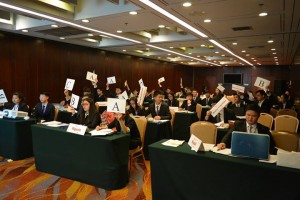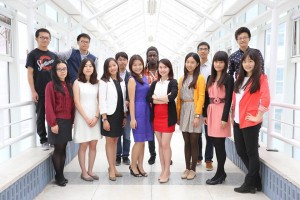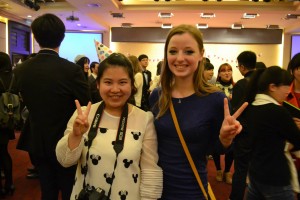2015年北京大学国际模拟联合国大会
四月9号日至12日我参加北京大学国际模拟联合国大会,担任国际劳动组织“妇女劳动权益与性别平等”辩论的美国资方代表,也是这次会议唯一的外国代表!自2007年创立伊始,AIMUN已成为一个吸引着全球青年的舞台。在这里,青年心怀世界,探讨政治、经济、环境等多领域问题。同时,AIMUN作为中国最有知名度的模拟联合国会议之一,在这个平时避免碰到政治讨论的国家,模拟联合国这个舞台则让青年对该问题形成看法的机会,现在在中国模拟联合国会议已经流行了。
我以前从来没有听过中国年轻人讨论政治的事,因此AIMUN给我带来了新鲜的感受。虽然辩论中没碰到中国国内的政治事务,听见大学生从其他国家视角出发很有趣。写决议书时,我发现其他代表的看法跟我自己的不太一样。例如,美国政府代表表现得好像有一种独裁权力,跟现实政府不同,他对国民与非政府机构表态是用有“强制”意思的词语。他的表现可能归于中国政府的权力,如果政府实施措施,国民就顺从。我跟他解释,美国更强调自由意志,而且,因为选举这个事情政府也需要考虑到让国民满意。在这次辩论妇女权益的会议上,我徒然试图提高对目前在英国与美国爆发的女权运动的认识,毫不吃惊的没有人听说过,所有我关注的媒体平台在中国翻墙后才能看到。
不言而喻,我没注意到辩论中微妙之处,就我理解,这次辩论太“友善”了,缺乏亮点和创造力,代表们宁愿导致紧张状态,还不如合作。因此,我们花了很长时间定义等等。总之,我感觉大家太注意到优秀演讲的国家,而没关注演讲缺乏的国家。我特别赞同韩国代表的表演,她注意到韩国保守社会的性别角色,讲到妇女愿意让男性去领导这一点。
AIMUN的代表来自中国各地参加大会,大部分也是他们大学唯一的代表。AIMUN还举办了开幕式、闭幕式、市内观光、欢迎舞会及告别舞会。演讲嘉宾也在两次仪式上致辞,包括中国联合国协会副总干事沈茵茵女士。听到这些国际任务致辞使会议的目标感更强,就像我们跟世界上所有其他模拟联合国会议握手一样。这次会议是很难得的机会,让我认识到中国各地的大学生,与他们举动学术辩论。
ENGLISH TRANSLATION:
Asian International United Nations 2015
On the 12th of April I took part in the Asian International United Nations, and was given the role of “US Employers” in the International Labour Organisation’s debate on “Women’s Labour Rights and Gender Equality”. I was the only foreign delegate in the room! Since it began in 2007, AIMUN has been a platform for youths around the world who share a common interest in understanding global issues and working together to come up with lasting solutions. AIMUN is amongst the best known and most recognized MUN conference in China. In this nation which often avoids talking about politics, the platform that is the Model United Nations provides a way for young people to develop opinions on global issues, and due to this fact, MUNs have become popular all over China.
I have never had the chance to witness young people discussing politics before, and in this sense AIMUM was a completely new experience. Although nothing about China’s internal politics was discussed, it was interesting to hear these university students take on the view of other nations and debate in their place. I did notice some unusual points when drafting resolution papers. For example, the US Government representative acted as if he had a much more authoritarian role than in reality- using words implying “force” towards the population and organisations. This could stem from living in a country where, if the government wants something, people will bend to it. I explained that in America, there was more of a sense of free-will, and the government also had to think about pleasing the people, from an election perspective. In this debate on women’s rights in the workplace, I also tried in vain to raise awareness of the current young feminist movement in the UK and US, but no one had heard of it, unsurprisingly as the media channels I follow are blocked.
There were of course many subtleties that I was unable to pick up on, but in general I felt the debate was too “nice” and there lacked the spark of an argumentative debate; delegates seemed hesitate to cause tension, more willing to cooperate together. As a result a lot of time was spent defining terms and deciding the direction of the debate. I felt that largely, countries with good speakers were overly represented and dominated countries who didn’t present as well. However I thought South Korea was particularly impressive when talking about gender roles in conservative Korean society and how many women are willing for men to take the lead.
The delegates of AIMUN came from all over China to participate in the conference, mostly representing their whole universities. AIMUN also organised welcoming and closing ceremonies and extra events like a city tour, a cocktail party and farewell party. The ceremonies also had guest speakers including the Deputy Director-General of the United Nations Association of China, hearing such international figures speak gave the conference a sense of greater purpose, like we were linked to other MUNs around the world. The conference was a fantastic opportunity to meet Chinese students from all over the country and engage with them on an academic level.



